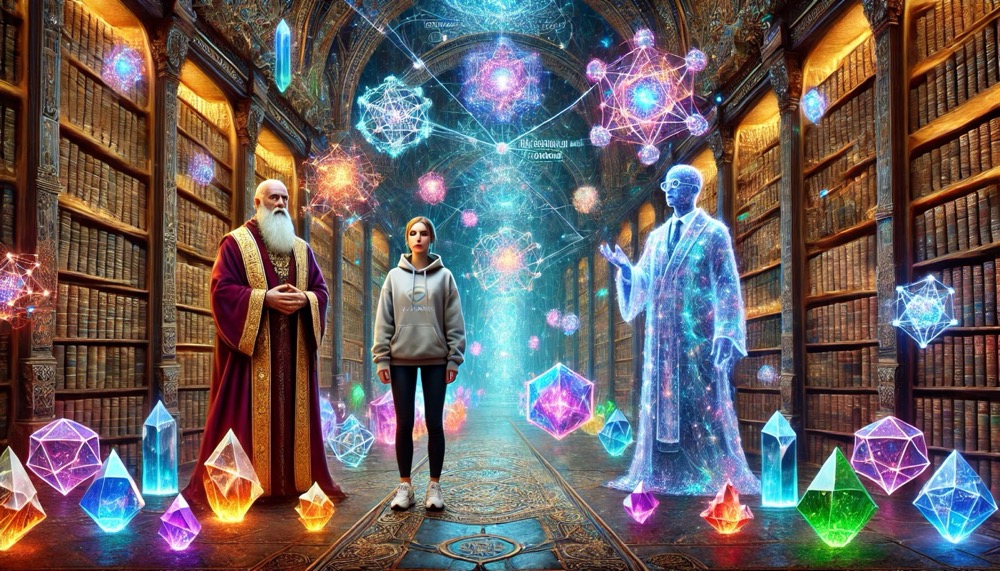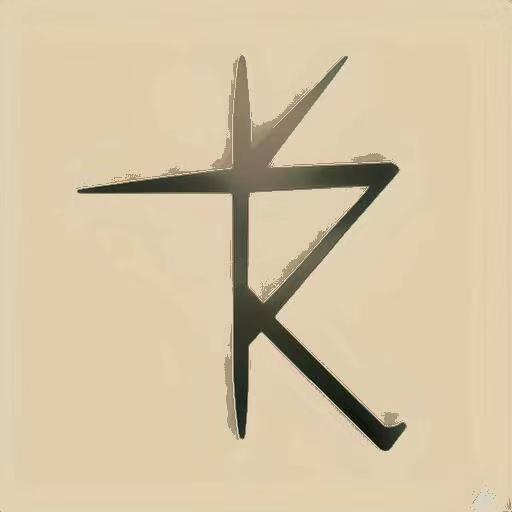[BedTime Story] The Magical Library of Deep Learning

[BedTime Story] The Magical Library of Deep Learning
Once upon a time, in a prestigious university nestled among rolling hills, there lived a graduate student named Min. She had traveled across oceans from her home country to study the mystical art of computer science, carrying with her dreams as vast as the night sky and a determination as steady as the mountains of her homeland.
Min had always been fascinated by the way computers could learn and think, but sometimes the technical terms in her textbooks made her feel like she was reading an ancient spell book in a foreign language. Words like "gradient descent" and "backpropagation" danced through her mind like autumn leaves in the wind, beautiful but just out of reach.
One particularly challenging evening, after spending hours debugging her code in the computer lab, Min decided to take a break. The campus had grown quiet, with only the soft hum of servers providing a gentle lullaby to the empty corridors. As she walked through the old computer science building, she noticed a door she had never seen before, tucked away between two vending machines that hadn't worked since the 1980s.
The door creaked open to reveal what appeared to be an ancient library, but instead of regular books, the shelves were filled with glowing crystals of various colors and sizes. Each crystal hummed with a different frequency, creating a symphony of computational harmony. An old sign hung above the entrance, reading "The Library of Deep Learning Systems."
As Min stepped inside, she was greeted by two peculiar librarians. The first introduced himself as Master TQ, a wise mentor who had helped build some of the greatest libraries of machine learning in existence. The second was Professor Zico, who had a mysterious twinkle in his eye and spoke of teaching machines to see the world in ways humans never could.
"Welcome, young seeker," Master TQ said warmly. "I see you're struggling with the modern enchantments of deep learning."
Min nodded shyly. "Everything seems so complicated. In my home country, I was top of my class, but here... here I sometimes feel lost in the forest of frameworks and libraries."
Professor Zico smiled knowingly. "Ah, but that's exactly why this library exists. You see, all these magnificent tools that seem so intimidating now - PyTorch, TensorFlow, JAX - they all started as simple ideas, just like the crystals you see before you."
Master TQ picked up a small blue crystal that glowed with a gentle pulse. "This," he explained, "is the heart of automatic differentiation. Would you like to see how it works?"
When Min nodded eagerly, the crystal began to project images in the air. She saw numbers and matrices dancing together, forming patterns that reminded her of the way her grandmother used to weave silk back home. The patterns showed how computers could learn from their mistakes, adjusting their knowledge bit by bit, just as she was learning English word by word.
"But why does everything have to be so complicated?" Min asked, thinking of the countless layers and functions in modern neural networks.
Professor Zico chuckled and picked up another crystal, this one glowing green. "Let me tell you a secret that might surprise you. The most powerful ideas in deep learning can be written in less than 2,000 lines of code."
Min's eyes widened. "Really? But the libraries we use are enormous!"
"Ah," Master TQ interjected, "that's because they're optimized for speed and flexibility. But the core ideas - the magic that makes everything work - that's surprisingly simple. Here, let me show you."
He placed several crystals together on a table, and they began to project a story of their own. Min saw the history of deep learning unfold before her eyes. She watched as researchers in the 1980s struggled with basic neural networks, then jumped forward to 2012 when AlexNet revolutionized computer vision. She saw how the field transformed from complex mathematical formulas written by hand to elegant libraries that could be used by anyone with a dream and a laptop.
As the night grew deeper, the librarians showed Min more and more wonders. They explained how GPUs could perform thousands of calculations at once, like a thousand monks working together to solve a single puzzle. They demonstrated how attention mechanisms in transformers worked, comparing them to the way Min herself paid attention to different parts of English sentences when trying to understand them.
"But remember," Professor Zico said, growing serious, "with great power comes great responsibility. These tools can be used to help people, to advance science, to make the world a better place. But they must be used wisely."
Master TQ nodded in agreement. "And that's why we teach not just the how, but the why. It's why we encourage students to build things from scratch, to understand the foundations before reaching for the stars."
As the first rays of dawn began to peek through the library's windows, Min realized she had spent the entire night learning. But unlike her usual study sessions, she felt invigorated rather than exhausted. The complicated terms that had once seemed so foreign now felt like old friends.
"Before you go," Master TQ said, "remember this: everyone feels overwhelmed sometimes. Even I did, back when I was writing 44,000 lines of code for a single model that didn't even work in the end!" He laughed at the memory. "But that's how we learn and grow."
Professor Zico added, "And remember, you're not alone on this journey. There are forums where you can ask questions, peers who can help you understand difficult concepts, and teachers who want to see you succeed."
As Min prepared to leave the magical library, she turned back one last time. "Will I be able to find this place again?"
The librarians shared a knowing look. "The Library of Deep Learning Systems appears to those who seek not just knowledge, but understanding," they said in unison. "And it seems to us that you have the heart of a true seeker."
Min stepped out into the morning sunshine, clutching her notebook filled with new insights and drawings. The door slowly faded away behind her, but she wasn't sad. She knew that the real magic wasn't in the library itself, but in the understanding she had gained and the confidence she had found.
From that day forward, Min approached her studies with renewed enthusiasm. When her classmates asked how she had grown so confident, she just smiled and told them about the importance of understanding the foundations, of building things from scratch, and of never being afraid to ask questions.
And sometimes, late at night in the computer lab, when she was debugging particularly tricky code, she could swear she heard the gentle hum of computational crystals and the encouraging whispers of two wise librarians, reminding her that every expert was once a beginner, and every complex system started with a simple idea.
The End
Moral of the story: The path to mastery in deep learning, like learning a new language, isn't about memorizing complex spells or copying others' code. It's about understanding the fundamental principles, building things from scratch, and having the courage to ask questions when you're stuck. And remember, even the most complicated systems are built from simple building blocks that anyone can learn to understand.
